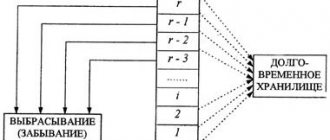The situation when someone wants to erase an event from their memory or forget another person does not arise very rarely in life. But not everyone can cope with this task on their own. One way to solve the problem is to get rid of painful memories or forget the person using hypnosis. Often this is the only way to help a person, get rid of addiction, and get him out of stress. If the situation was traumatic, emotionally difficult, memories of it depress the psyche and often become painful. The same thing happens when there is a break with a close, significant person. Or when a strong emotional attachment is not answered. I want to get rid of the painful attraction, but nothing works. In such cases, they resort to hypnosis to forget the bad.
What are memories made of?
A memory is not a one-dimensional thought or idea. It is the sum of impressions from specific events in your past. You remember not a point in time, but many sensory details.
For example, if you try to remember a pleasant day spent at the beach as a child, more than just the image of a river will come to mind. You will remember how warm the sand was, the smell of the wind and the taste of the ice cream you bought at the kiosk across the street.
Any of these sensations can become a trigger. When you buy an ice cream that tastes similar to the one from your childhood, you will be transported back to a hot day on a river beach.
Thus, memories are inseparable from context.
How to manage memories?
Context is the most important factor for anyone who wants to learn how to manage their memories. After all, with its help you can consolidate a memory. The wider and brighter the context, the more strongly we remember the event.
Let's go back to the memory of a hot day at the beach. It is advisable that you remember details, settings, emotions and feelings. Then the context will be formed.
If you remember the easy flow of river water, the warm sand of the coast, the hot asphalt of the path next to your umbrella and the creamy taste of ice cream, the memory of this day will remain very vivid and full for many years. The broader the context, the more varied the experience. This is what we recall when we remember a hot day spent in childhood.
So if we know how to use context to create a memory, can we find a way to erase our memories?
New hypnosis and strategic psychotherapy
This phrase is consistently among the top search queries on my website. The question is regularly asked: is it possible to forget, erase from memory, throw out of your head a person, situation, relationship or something else with the help of hypnosis?
The mechanism of forgetting is built into our memory by nature. With the exception of a very small number of people with eidetic memory, who remember everything that happened to them in life down to the smallest detail, we all forget information. Information from short-term memory is forgotten very quickly - you can forget a phone number or a name you just heard, or the lines of a poem you learned the day before. But information from long-term memory is more difficult to forget. Memories that are stored most reliably in memory are those that contain intense emotions. It is not surprising that in most cases the request to “erase” a memory refers to unpleasant, painful life events. Most often, such requests come from the mouths of young men and women who suffer from a breakup or the loss of a loved one, who are in love with unrequited love, or who are otherwise experiencing other painful events. The desire to get rid of pain is normal and natural, in this we are all alike. The desire to get rid of psychological suffering in a simple and quick way is, rather, a desire to find a “shortcut” in the tangled labyrinths of life and the nervous system, the path of “least resistance.” Why wait, suffer, think, go to a psychologist or read smart books, trying to understand your feelings? It seems easier and faster to just go to a hypnotist, who will erase, tear out memories from the grasp of the mind and leave an undisturbed emptiness inside.
In part, these thoughts arise from the mysterious and foggy atmosphere that is created around hypnosis. And this fog does not arise on its own, because it can conveniently hide any gaps and shortcomings, and can take the form of any mirage that comes to mind. On television and in speeches, hypnotists claim that “the possibilities of the mind are limitless,” and if so, why not just throw unnecessary junk out of your head? Such unhealthy excitement will further spoil the blood of psychotherapists.
And as luck would have it, you usually want to forget exactly what is most firmly ingrained in your memory. No one is asking you to forget some unnecessary set of numbers, an old address, or, for example, to forget the knowledge of geometry that was practically forcibly drilled into you at school. I want to forget a painful breakup, forget my feelings for a person who will never be there, forget shame and guilt, forget disappointment and disgust. Something that, most likely, will remain a person’s companion for many years, and maybe for life.
If only it were that simple. The mind is designed in such a way that nothing can be rejected, torn off, or erased from our memory artificially. No matter how much we would like, we cannot throw out of our memory something that has a special meaning for us, surrounded by many associations and experiences. Some memories are forgotten on their own, and we have to try to keep them vivid and alive in our memory. But here, even against our will, these images can emerge over and over again, spontaneously and when we encounter something that reminds us of this.
It is impossible to erase anything from memory. Moreover, it is not safe to try. Yes, the mind has the ability to block memories, repress them, dissociate them, disconnect them from the conscious mind. And there are mechanisms that allow such repressed processes to live their lives in the shadow of the unconscious and manifest themselves at the ideodynamic level in the form of dreams, pain, moods, symptoms, and so on. This is probably familiar to anyone who has tried to find a way to get rid of memories. If you plug a leak in one place, it will burst in another place. What seeks expression in the mind will find it, whether we like it or not. And when this happens against our will, it is usually more dangerous and harmful than when it happens consciously.
But there is another factor. As I said, the things that are remembered best are those that have special emotional meaning. And our mind does not attach emotional meaning at random, but on the basis of important processes related to needs, deep-seated beliefs and values. These processes cannot simply be turned off or reversed. And if some event caused a deep emotional response, it happened for a reason. And since we most often want to forget something irrational, inexplicable, spontaneous, uncontrollable - exactly what could be the door to further growth and development - we thereby ignore the signals of our mind, which tells us: this is the event, this relationship, this person is very important for your own development, for you to become stronger, freer, wiser. And instead of forgetting about it, we need to really look at it, look even more closely, even more thoughtfully, try to look through the eyes of a beginner who may see something that he did not notice before. It's difficult, it's difficult, and it's probably the only thing we can do that's actually worth doing. And the process of oblivion is best left to time. But practice shows that as a result of competent psychotherapeutic work, the past really remains entirely in the past.
How can you erase memories?
A forgetting strategy may be to allow yourself to forget certain details of an event in order to destroy the memory completely.
To test this assumption, scientists conducted a study in which two groups of people took part. They had to learn words from two separate lists while simultaneously looking at photographs of different landscapes to create context for the memory.
One group was told to approach the task very carefully: memorize the first list of words and only then move on to the second. Subjects from the second group were asked to first learn words and then forget them. Then the volunteers had to repeat what they remembered.
The brain activity of the experiment participants was studied using functional MRI. It turned out that the subjects who forgot the learned words had a much lower level of activity in the part of the brain that is responsible for processing images. This group of participants simply let the words and images slip from their minds.
When the brain tries to remember words, facts, images, it is constantly working to create context. When the brain tries to forget something, it initially rejects the context and abstracts itself from it. Therefore, memories are created with difficulty and do not last long.
If we return to the example with the beach, we can say this: in order to forget this day, you would have to specifically try to forget the taste of ice cream and the hot sand under your feet.
Is it possible to delete a memory completely?
Does this method always work 100%? Of course not. It’s impossible to say that scientists have discovered a magical way to forget, like in the movie “Eternal Sunshine of the Spotless Mind.” We know too little about the brain and memory and do not know how to erase memories.
Forgetting is very useful. We can use it to help us cope with a traumatic experience or painful event. Forgetting is necessary to clear the brain of unnecessary information.
In the experiment, participants remembered and forgot simple things: words and pictures. A real memory consists of dozens of details and sensory impressions, so erasing it is not so easy. But this research is the first step in the beginning of a very intriguing and alluring path.
It looks like we can figure out how to forget unpleasant and unnecessary things. More importantly, we will learn to remember happy days and moments for the rest of our lives.
Scientific way
If it was not possible to cure fear in a natural way, then science will help. To be honest, she can’t do anything yet, but she is carefully preparing for release into the big world three technologies that can eliminate painful memories.
Beta blockers against spiders
Recently, in the Netherlands, arachnophobes were subjected to a real nightmare. They were shown a cage infested with tarantulas and, while in a state of panic, were given beta blockers, which are commonly used to treat high blood pressure but are also known to limit norepinephrine levels. This method turned out to be damn effective. Gradually, the arachnophobes managed to drive fear out of their heads, and after a few days, the hairy four-legged creatures no longer caused such fear in them.
We treat with gas The most difficult thing to survive are the memories associated with the death of loved ones - they can truly ruin your life. The unfortunate people who lost their loved ones were invited to participate in the experiment. The fact is that quite recently a therapy has been developed that includes xenon gas, which is used as an anesthetic in Europe. The gas affects certain receptors in the brain that are closely associated with learning and memory. The patient simply inhales the gas through a kind of inhaler, and the process of neutralizing negative memories begins in the head.
Like in “Eternal Sunshine of the Spotless Mind” You probably thought that this article would mention at least once the wonderful film “Eternal Sunshine of the Spotless Mind”. And now the time has come. As you remember, in the film itself, Jim Carrey's brain was exposed to an electrical impulse while he was sleeping. Approximately the same device is at the testing stage. However, for now it is being tested exclusively on mice. The unfortunate experimental subjects were sent to places that had previously caused them fear and panic and, therefore, discouraged any desire to go there. All that remains is to conduct experiments on the brain, which, although similar to that of a mouse, is much more complex in structure—on a human brain.











